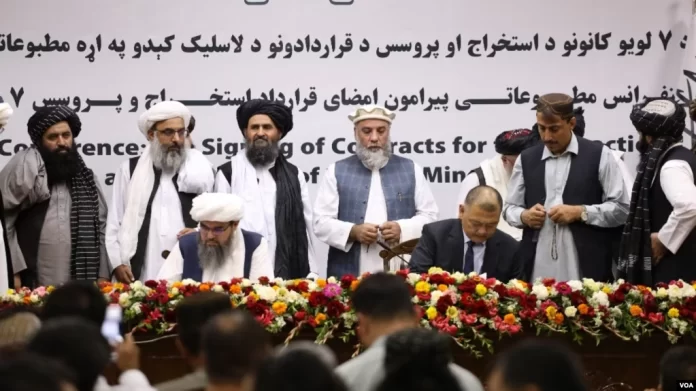
Afghanistan’s Taliban announced Thursday they have signed more than $6.5 billion worth of mining contracts with local and foreign companies from China, Iran, Turkey and Britain.
Shahabuddin Dilawar, the Taliban minister of mines and petroleum, said the seven contracts cover the extraction and processing of gold, copper, iron, lead and zinc in four Afghan provinces — Takhar, Ghor, Herat and Logar.
The nationally televised signing ceremony occurred as the de facto Afghan authorities marked the second anniversary of the withdrawal of all U.S.-led NATO troops from the country after nearly 20 years of war with the then-insurgent Taliban.
Dilawar said the seven contracts signed Thursday “will collectively bring a $6.557 billion investment” and create thousands of jobs in Afghanistan.
The minister said that an agreement awarded to a Chinese company for gold extraction in Takhar would bring the Taliban government a 65% share of the earnings over five years.
Dilawar said other contracts involving Turkish, Iranian and British investments for mining and processing iron ore in Herat would earn the government a 13% share over 30 years. “It will eventually turn Afghanistan into an exporter of iron,” he said.
Skeptics question the viability of the contracts, citing international economic sanctions imposed on the country after the Taliban reclaimed power in August 2021.
“The Afghan financial and banking sector is almost paralyzed and dysfunctional. Hence, no financial transactions or valuations,” Tamim Asey, a former official with the Afghan ministry of mines and petroleum, wrote on X, formerly known as Twitter.
He argued that the Afghan ministry “lacks technical-legal-police capacity” to manage and oversee such mining contracts.
“The legal-policy framework for the mining sector is not only vague but almost nonexistent. The regime doesn’t even have a constitution, let alone mining legal framework,” Asey said.
Earlier this year, a Chinese firm signed an oil extraction contract with the Taliban administration. Beijing lately has also shown interest in investing in lithium mining in Afghanistan.
The landlocked South Asian country reportedly has more than $1 trillion worth of precious minerals, including deposits of highly sought-after lithium used in rechargeable batteries.
The Taliban have stabilized Afghanistan’s economy and increased trade with neighboring and other countries, according to regional officials and independent monitors.
The World Bank said in its report last month that “the year-on-year inflation has been negative” for the past two months in Afghanistan.
“The supply of goods has been sufficient, but demand is low. Over 50% of Afghan households struggle to maintain their livelihoods and consumption,” the report said. It added that the local currency, the Afghani, appreciated against major trading currencies in the first seven months of 2023.
But the Taliban’s men-only government in Kabul remains under fire from the world because of its restrictions on women’s access to work and education.
Since seizing power from a U.S.-backed Afghan government on Aug. 15, 2021, the Taliban have imposed their strict interpretation of Islamic law, or Sharia, in the conflict-torn nation.
Edicts from reclusive Taliban supreme leader Hibatullah Akhundzada primarily set the policy guidelines for his government.
Akhundzada has banned girls from attending schools past the sixth grade and most women from working for the government and nongovernmental aid groups in a country where two-thirds of the population needs humanitarian assistance. The Taliban have closed thousands of women-run salons nationwide. Women are barred from visiting public parks and gyms and undertaking road trips without a male guardian.
The treatment of Afghan women has deterred foreign governments from recognizing the Taliban administration in Kabul, known as the Islamic Emirate of Afghanistan.
The last American soldier departed Afghanistan on Aug. 30, 2021, ending the longest war in U.S. history.
On Wednesday, President Joe Biden defended his troop exit decision in a statement marking the second anniversary of ending the Afghan war.
“We have demonstrated that we do not need a permanent troop presence on the ground in harm’s way to take action against terrorists and those who wish to do us harm,” Biden said.
The president referred to the July 30, 2022, drone strike that killed al-Qaida leader Ayman al-Zawahiri in his home in downtown Kabul.
Courtesy: VOA



